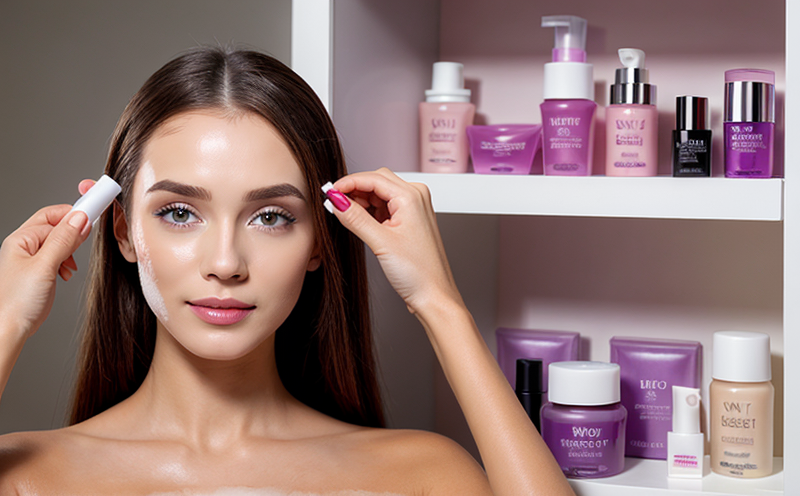GMO-Free Certification Testing in Cosmetics
In today's increasingly health-conscious and environmentally aware market, consumers are seeking products that align with their values. One such value is the avoidance of genetically modified organisms (GMOs) in personal care items. To meet this demand, many companies opt for GMO-free certification testing in cosmetics. This service ensures that cosmetic formulations do not contain any GMO-derived ingredients and can be marketed as 100% GMO-free.
Consumer trust is paramount in the beauty industry. A study by Nielsen found that nearly half of consumers worldwide would switch brands to one perceived as more ethical, such as those that are GMO-free. This presents a unique opportunity for companies to differentiate themselves and build a loyal customer base. Offering GMO-free certification testing can also lead to increased sales, reduced legal risks, and improved brand reputation.
The process of GMO-free certification involves several steps, including ingredient sourcing, formulation design, and rigorous testing. Quality managers and compliance officers play crucial roles in ensuring that all ingredients comply with strict standards. R&D engineers are responsible for designing formulations without any prohibited substances, while procurement teams must source only non-GMO materials.
The primary goal of GMO-free certification is to provide transparency and assurance to consumers about the origin of ingredients used in cosmetics. This not only meets regulatory requirements but also enhances brand image. By adhering to these stringent standards, companies can ensure that their products are safe for use by individuals with sensitivities or allergies related to certain genetically modified organisms.
Testing methods for GMO-free certification typically include DNA analysis and PCR (Polymerase Chain Reaction) techniques. These scientific approaches allow laboratories to detect even trace amounts of GMOs present in formulations. Laboratories accredited by reputable organizations like ISO 17025 ensure accuracy and reliability, providing peace of mind to both manufacturers and consumers.
Compliance with international standards is essential for any successful certification program. For instance, the GMO-free label must meet guidelines set forth by organizations such as the European Union's Novel Food Regulation or the U.S. Food and Drug Administration (FDA). By adhering to these stringent criteria, companies can gain a competitive edge in the global market.
Accurate reporting is another critical aspect of GMO-free certification testing. Laboratories must provide comprehensive reports detailing test results, including any potential contamination levels found during analysis. These reports serve as evidence that supports claims made on product labels and advertisements.
Scope and Methodology
The scope of GMO-free certification testing in cosmetics encompasses several key areas:
| Test Parameter | Description |
|---|---|
| Ingredient Analysis | Detailed examination of individual ingredients to ensure they are non-GMO. |
| Formulation Testing | Comprehensive evaluation of final product formulation for any GMO contamination. |
| Labeling Compliance | Verification that all labeling accurately reflects the absence of GMOs in the product. |
The methodology employed by accredited laboratories includes:
- Sample preparation involving thorough extraction and purification of DNA from various ingredients.
- DNA isolation followed by PCR amplification to identify specific sequences indicative of GMOs.
- Data analysis using advanced software tools to interpret test results accurately.
The use of cutting-edge technology ensures precise identification of even minor traces of GMO contamination, making this testing process both reliable and efficient. Compliance with international standards guarantees that the certification is recognized worldwide, enhancing brand credibility.
International Acceptance and Recognition
- European Union: EU Novel Food Regulation requires rigorous scrutiny of new ingredients to prevent GMOs from entering food or feed chains.
- United States: FDA guidelines encourage transparency regarding the use of non-GMO ingredients in cosmetics.
- Canada: Health Canada mandates strict adherence to labeling rules for products claiming to be free from GMOs.
- Australia/New Zealand: The Joint Food Standards Code provides clear definitions and criteria for GMO-free claims.
Companies seeking certification should familiarize themselves with these regulations, as compliance ensures that their products meet global standards. This international acceptance enhances brand reputation and facilitates market expansion into regions where consumer demand for non-GMO products is high.
Competitive Advantage and Market Impact
Gaining GMO-free certification can significantly enhance a company's competitive position within the cosmetics industry. Here are some ways this certification impacts business:
- Better Consumer Perception: Consumers increasingly prefer products that align with their ethical beliefs, making GMO-free certification a key factor in building brand loyalty.
- Increased Sales: Studies show that consumers willing to pay more for eco-friendly and ethically produced goods are likely to purchase certified non-GMO cosmetics.
- Reduced Legal Risks: Compliance with international standards protects companies from legal challenges related to false advertising or misleading labeling claims.
- Enhanced Brand Reputation: Successful certification demonstrates a commitment to quality and integrity, which can significantly improve brand reputation.
In conclusion, GMO-free certification testing in cosmetics is more than just an option; it's a strategic move that helps companies stay ahead of market trends. By ensuring compliance with international standards, companies not only protect themselves from potential risks but also position themselves as leaders in the ethical beauty industry.





